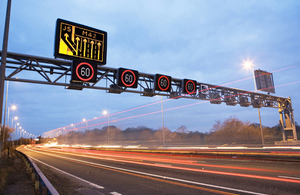Protecting Spaghetti Junction’s future will take longer than expected
Crucial repairs to safeguard the future of one of England’s busiest junctions have been extended.

Every effort will be made to minimise the impact on drivers.
The Highways Agency is currently replacing vital waterproofing at The Gravelly Hill Interchange in Birmingham, known the world over as Spaghetti Junction.
Engineers have found clusters of damage around loadbearing supports and joints – the location of which will make the necessary repairs very challenging. In some areas, water has breached the old waterproofing, damaged the concrete deck and corroded the internal steel reinforcement.
We expected to carry out concrete repairs as part of this work,” explained project manager Jess Kenny.
But we were also aware that we wouldn’t know the full extent of what needed doing until we began the work and were able to remove areas of the road surface.
Unfortunately, we’ve now discovered that the location of the damage is such that the repairs will be more extensive and take longer than at first thought, so the work won’t be completed until next year.
Spaghetti Junction is now more than 40-years-old, and carries the weight of 200,000 vehicles every day.
Waterproofing is a vital component of any concrete infrastructure – it is needed to help protect the steel support beams which run throughout the concrete.
As part of the re-waterproofing project, it was estimated around 2.5% of the concrete carriageways of Spaghetti Junction would need repairs. This has turned out to be the case, but the problem now isn’t the scale of the damage – it’s the location. Engineers will have to tackle the repairs in small sections, as the integrity of the bridge structure would be compromised if large areas of concrete are removed.
Not only will engineers have to work in short phases, but the concrete itself will need time to cure once its put in place.
We’d love to be able to pull up all the surfacing and complete this work in one go: but that would seriously weaken the integrity of the bridge deck and cause a real threat that the structural stability of the bridge will be compromised,” Jess Kenny explained.
We’ve had to perform a lot of calculations to accurately work out how we can perform these repairs.
The outcome is that we need several small phases of work – but this will also extend the time we need to work on Spaghetti Junction.
The extent of the required repairs mean the team now expects its work to last until spring 2016.
The Agency will continue to work in close contact with Birmingham City Council to mitigate the effects of its work on drivers. Diversions will remain in place throughout, and the Agency has committed to managing traffic to retain as much access as possible. When closing the M6 northbound on-slip carriageway and the M6 southbound on-slip carriageway from the M6 junction 6 Salford Circus junction, traffic will be diverted along the A5127 Lichfield Road towards Birmingham.
At the A5127/B4132 roundabout, traffic will be diverted along the B4132 Waterlinks Boulevard to Park Circus roundabout, then onto the A38(M) Aston Expressway Out of City, back towards Gravelly Hill where the M6 northbound and southbound carriageways can be accessed.
When closing the A38(M) Aston Expressway Out of City route, traffic will be diverted along the A34 Birmingham Road towards M6 Junction 7, where the M6 northbound and southbound carriageways can be accessed.
More information on the schemes is available on the Agency’s website:
General enquiries
Members of the public should contact the Highways Agency Information Line on 0300 123 5000.
Media enquiries
Journalists should contact the Highways Agency press office on 0844 693 1448 and use the menu to speak to the most appropriate press officer.